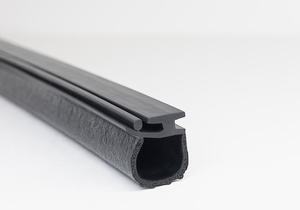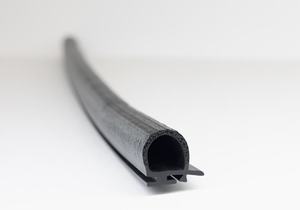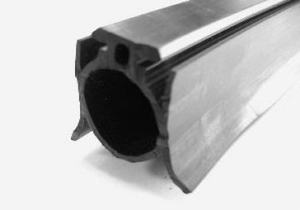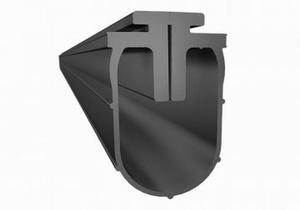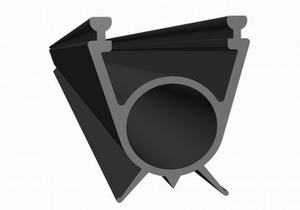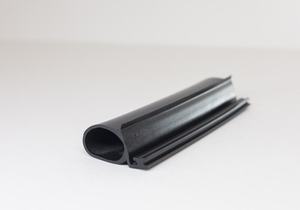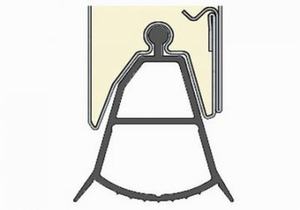Automatic door seals, also known as automatic door bottoms (ADB), are sophisticated sealing mechanisms designed to provide a reliable and effective barrier against sound, air, dust, smoke, and drafts at the bottom of doors. These seals are commonly used in commercial, industrial, and residential buildings to enhance energy efficiency, improve indoor air quality, and maintain comfort levels. Here’s an in-depth exploration of automatic door seals, including their mechanisms, features, benefits, and applications:
1. Mechanism and Operation:
- Drop Seal Mechanism: Automatic door seals typically feature a drop seal mechanism that activates when the door is closed. As the door closes, a plunger or drop bar mechanism located within the seal assembly is engaged, causing the seal to drop and make contact with the floor surface.
- Compression and Sealing: Once engaged, the automatic door seal compresses against the floor, creating a tight seal that prevents the passage of air, sound, and other environmental elements. This compression action ensures that the seal adapts to variations in floor surfaces and maintains consistent sealing effectiveness.
- Automatic Retraction: When the door is opened, the drop seal automatically retracts, allowing the door to move freely without obstruction. The retraction mechanism may utilize springs, magnets, or other mechanisms to retract the seal smoothly and efficiently.
2. Features and Design:
- Adjustable Length: Many automatic door seals offer adjustable length capabilities, allowing them to accommodate doors of various sizes and heights. This adjustability ensures a proper fit and optimal sealing performance across different door configurations.
- Durable Construction: Automatic door seals are constructed from durable materials such as aluminum, stainless steel, or high-grade polymers to withstand frequent use, heavy foot traffic, and exposure to environmental conditions.
- Integrated Gaskets: Some automatic door seals feature integrated gaskets made from resilient materials such as silicone or neoprene rubber. These gaskets provide additional sealing effectiveness and flexibility, ensuring a secure seal even on uneven or irregular floor surfaces.
- Fire and Smoke Ratings: Certain automatic door seals are designed to meet fire and smoke containment requirements, offering fire resistance and smoke seal capabilities to enhance building safety and compliance with fire codes and regulations.
3. Benefits of Automatic Door Seals:
- Energy Efficiency: By sealing gaps at the bottom of doors, automatic door seals help to prevent air leakage and drafts, reducing heating and cooling energy consumption and improving building energy efficiency.
- Soundproofing: Automatic door seals effectively block the transmission of sound, minimizing noise pollution and creating quieter, more comfortable indoor environments in commercial, residential, and hospitality settings.
- Air Quality and Comfort: By preventing the infiltration of outdoor pollutants, dust, and allergens, automatic door seals contribute to improved indoor air quality and occupant comfort, particularly in buildings located in urban or industrial areas.
- Privacy and Security: Automatic door seals enhance privacy and security by minimizing gaps that could allow visual or auditory intrusion, ensuring confidentiality and peace of mind in offices, meeting rooms, and sensitive areas.
- Compliance and Certification: Many automatic door seals are tested and certified to meet industry standards and building code requirements for air leakage, sound transmission, fire resistance, and smoke containment, ensuring regulatory compliance and building safety.
4. Applications of Automatic Door Seals:
- Commercial Buildings: Automatic door seals are commonly used in office buildings, retail stores, hotels, hospitals, and educational facilities to improve energy efficiency, acoustic comfort, and indoor air quality.
- Industrial Facilities: Automatic door seals are employed in industrial environments such as manufacturing plants, warehouses, and clean rooms to minimize air infiltration, control dust, and maintain controlled environments.
- Residential Properties: Automatic door seals are increasingly popular in residential construction and renovation projects, where they help to enhance thermal comfort, reduce noise transmission, and improve energy efficiency in homes and apartments.
- Healthcare Facilities: Automatic door seals play a crucial role in healthcare settings such as hospitals, clinics, and laboratories, where strict infection control measures and acoustic privacy are essential.
- Hospitality Sector: Hotels, resorts, and hospitality venues utilize automatic door seals to create quiet, comfortable guest rooms, meeting spaces, and public areas, enhancing the overall guest experience and satisfaction.
In summary, automatic door gaskethttps://www.pvcpipeseals.com/automatic-door-seals/s are highly effective sealing solutions that offer numerous benefits in terms of energy efficiency, acoustic performance, indoor air quality, and security. Their versatile design, reliable operation, and wide-ranging applications make them indispensable components in modern buildings and facilities, where they contribute to comfort, safety, and sustainability.
